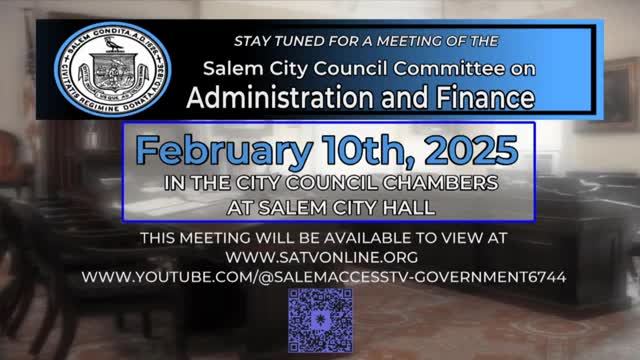Committee recommends $80,000 bollard design study for Essex Street pedestrian mall
Get AI-powered insights, summaries, and transcripts
Subscribe
Summary
The Salem City Council Committee on Administration and Finance voted to send a positive recommendation to the full council to approve $80,000 for a consultant-led design study and project management to install fixed and retractable bollards and related access controls on the Essex Street pedestrian mall.
The Salem City Council Committee on Administration and Finance voted to send a positive recommendation to the full council on Feb. 10, 2025, to approve $80,000 for a consultant study to design and help oversee installation of vehicle-control barriers on the Essex Street pedestrian mall.
Dave Picharski, director of transportation, told the committee the proposal from Bowman focuses on four access points to the mall and would include design drawings, bid documents, cost estimates for options (including fixed and retractable bollards), utility investigations and construction observation. “We essentially need to develop a design plan,” Picharski said.
The study would also evaluate where retractable bollards can be installed given subsurface utilities and may require additional surveying or subsurface scanning before construction, Picharski said. He described the consultant’s role as preparing plans and specifications, assisting with bid review and overseeing construction tasks.
Why it matters: committee members and public safety officials said the work is intended to better control vehicular access to the pedestrian mall, improve enforcement of existing vehicle restrictions and reduce the risk to crowds at high-attendance events such as Haunted Happenings. Chief Miller, chief of police, said his priority is “we should have a better line between what is truly a pedestrian area and one that where pedestrians share the area with cars.”
Committee discussion focused on four main topics: scope and cost of the Bowman contract, how bollards interact with accessibility and delivery needs, enforcement of existing ordinances, and implementation timing. Councilor Stott said the $80,000 price “seems really steep,” adding that “less than half of that goes towards the design,” and questioned whether the city could take on some construction-management tasks in-house. Council members also urged including residents and businesses in stakeholder outreach so changes do not come as a surprise to those who rely on deliveries to the mall.
Lieutenant Tucker described recent selective enforcement and said parking enforcement and police have issued tickets and warnings to delivery drivers who violated the posted hours. “The system would prevent that and, obviously, promote the safety of all the pedestrians there,” Tucker said, describing retractable bollards as a tool to firm up enforcement.
Committee members and staff discussed operational questions: how emergency responders would access the mall (each bollard location would have a control box for fire, police or ambulance), whether delivery hours should be revised, and whether some access points could be limited to reduce the number of retractable units needed. Chief Miller and staff cautioned that underground utilities and lead times for specialized equipment could delay full installation; staff said the goal is an interim plan this year and to complete installations well before October 2026 if possible.
Action: Councilor Watson Felt moved to return the item to the full council with a positive recommendation to approve the $80,000. Councilor Harvey seconded. The chair counted five hands in favor; the motion passed and the committee will forward the recommendation to the full Salem City Council.
Next steps: staff said they will work with the mayor’s office to identify stakeholders for the consultant kickoff and walk-through (police, fire, Department of Public Safety, downtown businesses, residents and historic/street-scape review bodies as appropriate). Bowman’s final scope will be clarified before contract execution to confirm construction observation hours and the level of specification for manufactured bollards.
The committee’s recommendation brings the design phase closer to authorization; the full council will consider the funding authorization in an upcoming meeting.
